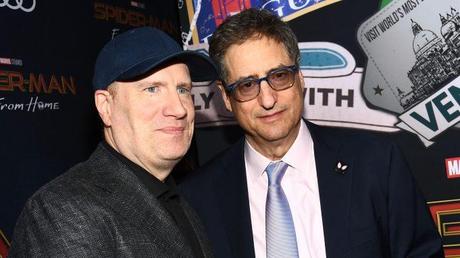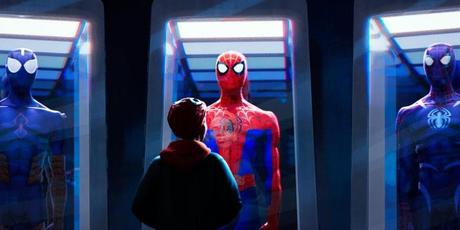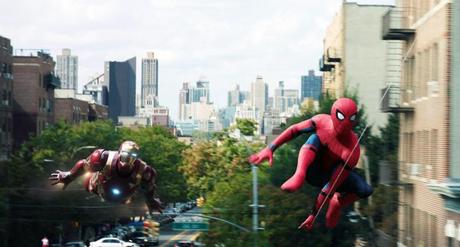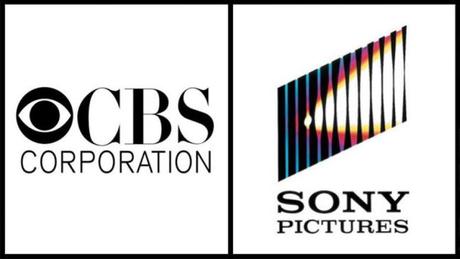You don't go from a 95-5 split to a 50-50 split without hitting some speed bumps.
That might be the charitable view of yesterday's bombshell Deadline report that Sony and Disney's mutually beneficial Spider-Man marriage has turned into an ugly divorce. Fresh off of Far From Home passing Skyfall to become Sony's highest-grossing worldwide release of all time, Disney - a studio which has more billion-dollar hits than bombs this year - felt it was time to negotiate a better deal. After all, Disney's Marvel Studios lends its creative pedigree and MCU characters to Sony's Spider-Man movies in exchange for 5% first-dollar gross and toy sales. Marvel made that deal because Kevin Feige was understandably desperate to save the Spider-Man character from Sony's chronic mismanagement. With great success, however, must also come greater profit-sharing.
Disney requested a 50-50 co-production split on all future Spider-Man movies and even asked about getting in on all of Sony's Spider-Man related projects, not just the ones starring Tom Holland. Sony countered with "why don't we just stick to our current deal?" Disney - possibly cribbing from Donald Trump's The Art of the Deal playbook - took the power back in the relationship by showing it could just walk away.
Or something like that.
The truth is we don't know what the heck happened here. We have Deadline's report and Sony's pithy, own-the-narrative response which blamed Disney for not figuring out how to clone Kevin Feige ye t. The actual text:
"Much of today's news about Spider-Man has mischaracterized recent discussions about Kevin Feige's involvement in the franchise. We are disappointed, but respect Disney's decision not to have [Feige] continue as a lead producer of our next live-action Spider-Man film. We hope this might change in the future, but understand that the many new responsibilities that Disney has given him - including all their newly added Marvel properties - do not allow time for him to work on IP they do not own."
 Kevin Feige and Tom Rothman in I wanna say better times but Rothman doesn't actually look so happy there.
Kevin Feige and Tom Rothman in I wanna say better times but Rothman doesn't actually look so happy there. In the hours since this all broke, Kevin Smith urged Sony and Disney to works things out, Sony's stock price dipped - sure, just -0.06, but that's still a negative - and, because the internet gonna internet, someone started a petition attempting to force a reunion and countless others threatened a Sony boycott.
Not to go all Kai Ryssdal on you, but we all just need to take a breath and relax. We don't know nearly enough about any of this to freak out about whether one superhero gets to continue playing with other superheroes or has to make new superhero friends. The deal might be as dead as Robert Downey, Jr.'s Tony Stark (too soon?), or we might just be witnessing two studios negotiating in public here. At the end of the day, they'll each do whatever they think is in their best interest of continuing to make a lot of money. I trust Bob Iger's judgment. Not so much with Sony head Tom Rothman. Not great, obviously.
But if we take the maximalist approach that the deal is dead forever, Sony's Spider-Man movies will now have nothing to do with the Marvel Cinematic Universe and thus Tom Holland cannot become the new face of the franchise ala Robert Downey, Jr. or Chris Evans - then, yeah, that sucks.
Let's briefly think through the possible good, the bad, and the ugly of this:
The Good

- Sony is now presumably free to do something it has so clearly wanted to for years: put Tom Holland's Spider-Man and Tom Hardy's Venom on screen together. Moreover, if Holland's Spidey is available for crossovers that also opens up some new possibilities for the Into the Spider-Verse movies. If this somehow ends up with Spider-Verse's Phil Lord and Chris Miller getting a hold of a live-action Spider-Man movie, the results could be amazing.
- That Sony and Disney at least made the deal work long enough for Peter Parker and Tony Stark to say goodbye. Their father-son bond was one of the more surprising and effective relationships of Marvel's Phase 3, and thankfully corporate greed never got in the way of letting it play out to our immense satisfaction.
- The world can stop worrying about Tom Holland inadvertently spoiling Avengers movies.
- Thanks to the Fox deal, Marvel Studios now has more characters at its disposal than ever before, so much so that some of the older ones like Ant-Man and the Wasp, if reports are to be believed, won't be getting future movies because there's just not enough time for them anymore. Losing Spider-Man wouldn't necessarily change that scenario but it could further embolden Marvel Studios to keep with its tradition of winning with the less-heralded characters and moving forward with Black Panther and Captain Marvel as the new faces of the franchise, not Spider-Man.
The Bad

Um, everything else? This move would certainly bolster the Venom movies but at the expense of the Marvel Cinematic Universe as well as the internal logic and reality of the Tom Holland movies. If they have to go from making a direct sequel to Endgame which is all about Peter Parker mourning Tony Stark to movies that might co-star Venom characters but can't even reference anything in the MCU, that's just absurd. For all of the actors in the cast - as well as director Jon Watts - who have contracts reportedly obligating them to appear in two more sequels, this has to feel like a "this isn't what I signed up for" situation.
What all of this has introduced is considerable uncertainty into an area we thought we had no need to worry about. Sony, in a come-to-Jesus moment, waved the white flag of defeat and begged Marvel to save Spider-Man from Avi Arad and Matt Tolmach, the chief architects of the Andrew Garfield movies. In the years since, Spider-Man has become an integral part of the Marvel Cinematic Universe, to the point that Aunt May is now kinda, sorta dating Tony Stark's former bodyguard.
Regardless of how you feel about what Marvel Studios has done, both directly and indirectly, to the film industry, it's hard to argue that they aren't damn good at what they do. If superhero movies are the only blockbusters that matter anymore, it's heartening to know that Marvel Studios almost always give us something which entertains, amuses, and is a tad smarter than it actually has to be. (Just look at the clever meta-commentary baked into Far From Home 's version of Mysterio.)
Sony, on the other hand, absolutely sucks at this. Just earlier this year, the studio put two MCU stars (Chris Hemsworth, Tessa Thompson) into a seemingly can't miss franchise ( Men In Black International) and produced a box office dud which somehow zapped all of the charisma out of its charismatic cast. Different film and set of producers than the people who will work on the future Spider-Man movies, I know, but, still, not a good sign.
It feels to me like Sony hit big with Jumanji, Spider-Verse, and Venom and suddenly thought everything was fixed when, in fact, the studio is still mostly in the business of making movies - Miss Bala, Holmes and Watson, The Possession of Hannah Grace, The Girl in the Spider's Web, The Front Runner, Goosebumps 2, White Boy Rick, Alpha, Superfly - which no one sees. Plus, surely the people at Sony realize Venom is a very not good movie. It made money and therefore has value and an inevitable sequel, but it is an exercise in extreme camp which might not be replicable and definitely shouldn't be seen as an excuse to pull Tom Holland away from the MCU.
The Ugly

This is all being decided - or at least partially decided - by people who might not even have their jobs in a year or two. When Shari Redstone recently achieved her lifelong dream of re-merging CBS and Viacom, the consensus take was that the newly merged entity wasn't nearly big enough to seriously hope to compete with the true conglomerates of the industry. Merging was a step in the right direction, but not the only step necessary. After this, CBSViacom needs to buy up other properties. Possibilities floated included the Starz cable channel and Sony's entertainment division, including its TV production arm and film studio.
Now, Sony has gone down this road of maybe selling but not selling before, but given the industry's trend toward consolidation and the constant headache the larger Sony corporation gets from its TV and film studios I wouldn't be stunned to see something actually happen this time. Sony severing ties with Disney and bolstering its own internal IP, albeit at the expense of the fans, might be seen as a way of making the studio all the more attractive to a buyer.

Grew up obsessing over movies and TV shows. Worked in a video store. Minored in film at college because my college didn't offer a film major. Worked in academia for a while. Have been freelance writing and running this blog since 2013. View all posts by Kelly Konda

